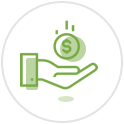The COVID-19 pandemic has changed the way we work, learn, shop, play and live this year, and potentially, forever. By adapting to these changes amid increased unemployment and economic uncertainties, we have also learned valuable money lessons to safeguard our financial health in the new normal.
Our wallets and job stability may have taken a beating in 2021, but we live to fight another day, armed with important tips so our finances will never be caught unawares again. Here are seven money lessons that will benefit you in 2021.
1. An emergency fund is super important
Ever since we were old enough to earn a paycheck, we have been encouraged to allocate parts of our salary to our savings (an untouched amount of money that is meant for your long-term goals) and emergency fund (which should comprise six months’ worth of income that you can use for unexpected expenses like retrenchment, job loss and urgent medical care). However, how many of us have actually followed that advice?
The Edge Markets reported that an estimated 48% of Malaysians still do not have any emergency savings. This was based on a survey by financial literacy platform Multiply.
If you are one of the more prudent Malaysians who have set up an emergency fund, well done! Since 2020 and 2021 were two years where a significant number of Malaysians were being retrenched or laid off, some of us have resorted to using our emergency savings. According to a report by Malay Mail, MIDF Research mentioned that Malaysia’s unemployment rate was around 4.3% in 2020 (compared to 3.3% in 2019).
So in the event of a job loss, you can use the emergency fund to support yourself and your loved ones while looking for new employment.
Lesson: Emergency savings will help you prepare for unexpected life circumstances that require you to spend more than usual – such as unemployment and car repairs.
Don’t have a 6-month emergency fund yet? It’s never too late to start one. This could be one of your New Year’s resolutions for 2022!
Here are some tips about starting your emergency fund:
- Keep your emergency fund in an account that is separate from your regular savings.
- Make sure you can easily withdraw cash from your fund.
- Check if your employer can directly deposit a percentage of your salary to your emergency fund account.
- If you have new financial commitments in your life such as the birth of your child, you should continue building your emergency fund beyond your original goal.
Related: #NewNormal: What To Do Immediately After Getting Retrenched Post COVID-19

In the event of a job loss, you can use the emergency fund to support your family while looking for new employment.
2. Live within your means
The year 2021 has shown us how important it is to have savings to fall back on when the unexpected happens. So in order to save more, let’s spend less.
Splurging on unnecessary items when you have limited funds is not a wise move, but it doesn’t mean you have to give up every luxury. You can find a balance between enjoying life and growing your savings by writing a budget each month and following it.
Calculate how much you need for essential expenses like bills and debt repayments. Then allocate a particular sum for your savings and emergency fund. You can use the remainder of your income to spend on things you enjoy.
Managing your money can also be a hassle-free process when you use budgeting apps like Mint, PocketGuard and Goodbudget.
Lesson: With effective financial planning, you can still attain the latest gadgets, savour fine dining and gratify your heart’s desire while your savings continue to grow.
3. Having your own medical insurance coverage
When people lose their jobs, they will no longer be able to utilise their previous employers’ health insurance plans as well. Thus, it is highly recommended that you also purchase your own medical insurance policy.
When we are in good health, some of us often question the need to spend money on medical insurance coverages. Others may postpone purchasing a policy… until it’s too late.
As 2021 has proven, a health crisis can strike anytime. If you fall ill or get injured while looking for a new job, brace yourself for some potentially expensive hospitalisation and outpatient treatment bills that might make you even more sick than before.
A medical insurance policy could have protected you from paying the full costs of the medical treatment. That’s why you should make it a point to allocate some money for your own insurance plan every month.
To purchase an insurance policy, you should start by conducting some online research for a plan that best suits your needs and budget. Many insurance companies also offer the option to purchase your policy online.
So good luck! Your quest for the ideal medical insurance plan begins here.
Lesson: Buying an insurance policy now might save you from a lifetime of medical debts later.
4. Avoid unnecessary debt
Large credit card bills and personal loans might seem manageable when you have a job, but you will feel the crushing pressure of debt if you become unemployed.
Until you find another job, your financial burden will become heavier as the monthly interests pile up on your existing debts. If you are still unable to pay your debts after a period of time, be prepared to face:
- A destroyed credit score
- Legal action from the banks
- Bankruptcy
Lesson: All these debt-related problems can be avoided if you use your credit cards responsibly. You also need to remember that a personal loan should be used for sensible reasons such as urgent medical operations and education courses.
Related: 7 Strategies To Get Out Of Debt Fast During The COVID-19 Pandemic

Avoid accumulating unnecessary debt by using your credit cards responsibly.
5. Stay safe with contactless payment
Since the start of the movement control order (MCO) on March 18, 2020, food delivery services like GrabFood and Foodpanda have recorded a huge increase in customers. By minimising cash usage and physical contact, these services provide a safer way to order meals from your favourite restaurants.
Whenever you don’t feel like preparing a home-cooked meal, just whip out your phone and order some food via a mobile app. Their delivery rider will soon arrive at your doorstep or condominium lobby with your meal. In addition, you can also have groceries delivered to your home!
The cashless payment approach has also increased in popularity at retail outlets. Customers can pay for their items by using a selection of e-wallets, which includes apps like Touch ‘n Go eWallet, GrabPay and Boost.
If you prefer to shop from home, e-commerce platforms such as Lazada, Zalora and Shopee offer a wide variety of products ranging from gadgets and electrical appliances to clothing, accessories and shoes.
Lesson: Despite the COVID-19 pandemic, the growth of cashless payment technology and e-commerce platforms will ensure that you can continue to shop in a safe environment.

Shop safely from home via e-commerce platforms such as Lazada, Zalora and Shopee.
You may have lost your job or gone through a pay cut, but you will still need adequate income to cover your monthly household expenses and bills. To support your family and yourself in these difficult times, you can get a part-time or freelance job.
This year, many Malaysians have taken on side jobs such as delivering goods, baking from home and conducting online tutoring. You can look for similar side gigs through job search platforms like WOBB and JobStreet, or offer your services on freelance platforms such as Toptal and Freelancer.
Lesson: Need extra money to fulfil your financial commitments during the COVID-19 era? Get a part-time or freelance job.

To earn extra money, many Malaysians have taken on side jobs such as delivering goods.
7. Future-proof your career by upskilling and reskilling
The job market has become increasingly competitive. These days, one open position can attract up to hundreds of applications. In order to stand out from other job applicants, you need to quickly adapt to the latest developments in your career by mastering new skills through upskilling and reskilling.
According to the Oxford dictionary, upskilling is “the process of learning new skills” while reskilling means: “to learn new skills so that you can do a new job.”
Thus, if you are looking for further career advancement in your current field, you can sign up for relevant upskilling courses via online learning platforms such as Coursera and LinkedIn Learning. These platforms also offer reskilling courses for people who plan to switch careers or adapt to different job responsibilities in an automated and digitized work environment.
Besides that, YouTube tutorials, webinars and e-books are other avenues that can help elevate your skills to the next level.
Lesson: To achieve career success, you should continue to develop additional work-related skills through upskilling and reskilling.
Ready for 2022?
We have almost made it to the end of 2021. Phew! Let’s learn from past experiences and make 2022 our best financial year yet.






















